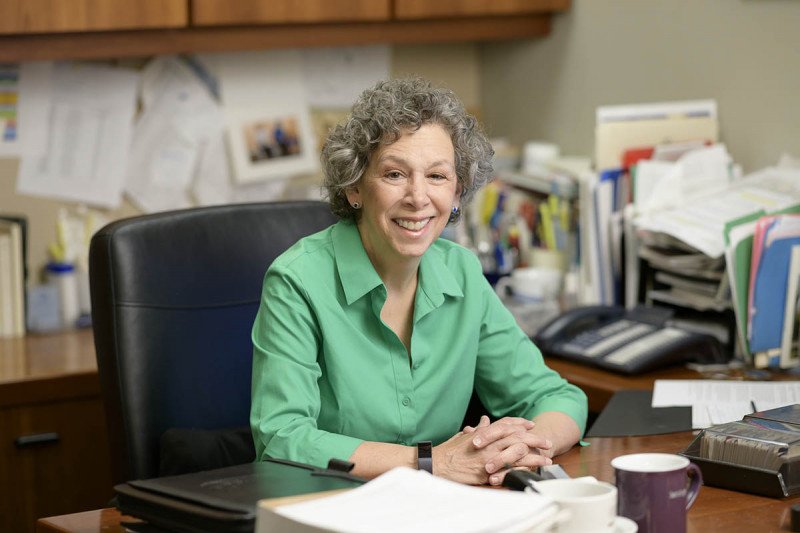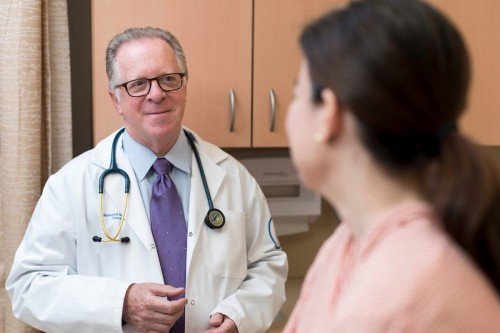
I went to my gynecologist for my routine checkup, and she found something. I wasn’t due for a mammogram until May, but she said, “I want you to have one now.” My attitude was, it’s probably nothing. I’d had biopsies in the past, and it was usually nothing. So I got a mammogram the next week and a biopsy that same day. I got a call the day after the biopsy saying I had invasive lobular carcinoma and that I should call a breast surgeon.

Having worked at MSK for nearly two decades, Laura knew she wanted her care to be in-house. She was quickly scheduled for an appointment with breast surgeon Alexandra Heerdt.
I liked her. She sent me for an MRI just to make sure there was nothing else there, and she actually called me at 8 or 9 o’clock that night to tell me that the MRI did not reveal any additional findings. I didn’t have to wait.
Dr. Heerdt wanted to perform a lumpectomy at MSK’s Josie Robertson Surgery Center, where many outpatient procedures take place.
I had surgery on Valentine’s Day. I felt pampered. You come in, they greet you, they send you upstairs, and you get a private room. After surgery, I remember waking up just fine. I had limited pain. I was home by 3 o’clock in the afternoon. Sinus surgery was worse!
Resilience through Radiation
Doctors analyzed Laura’s tumor with a test called Oncotype DX®, which determines if a cancer is more likely to recur. The results deemed that Laura did not need chemotherapy but would need four weeks of radiation therapy. She made a plan with MSK medical oncologist Ayca Gucalp and radiation oncologist Beryl McCormick.
The radiation is rough because it’s every day. The treatments themselves are less than 10 minutes, but when they do the simulation to prepare, you can’t move. Still, I never took off work for radiation.
The treatments proved difficult. Laura set her sights on ringing the bell in the radiation suite that signals the completion of treatment.
I never felt like I had cancer until I had radiation. About halfway through treatment I was really looking forward to ringing that bell. On the last day, my sister took my picture ringing the bell, and I burst into tears. I was shocked and embarrassed, but it overtook me. Everybody in the room applauded, and then I dried my tears and came back to work. There was a bouquet of flowers on my desk.
Moving Forward
In June, a friend of Laura’s from the Case Management Society of America asked if she could interview Laura for her blog. At first, Laura was hesitant to share her story, but she ultimately realized it might help others.
I sat down to answer her questions, and it just flowed. It was very therapeutic to write. I always told people my cancer was a nonevent, it was nothing, and then when I wrote about it, I found out it was something. I got such good feedback. Somebody came over to me at the train station and said, “I read your story and cried.” After that I started working with MSK’s writing program, Visible Ink.
Seven months after surgery, Laura is doing well. She takes medicine known as an aromatase inhibitor to keep the cancer at bay. She manages side effects with acupuncture at MSK’s Bendheim Integrative Medicine Center. She continues to work and volunteers with Shape Up NYC, a program offering free fitness classes.
My cancer was very early stage. It was a small tumor and hadn’t spread to my lymph nodes. As I have matured, I have found that getting anxious and expecting the worst does not help and is wasted energy. I have learned to just move forward and wait until I know what I am dealing with. My doctors said to me, “You did everything you could. You got your mammogram. You did your job. Now it’s our job.” That was a nice thing to hear.




